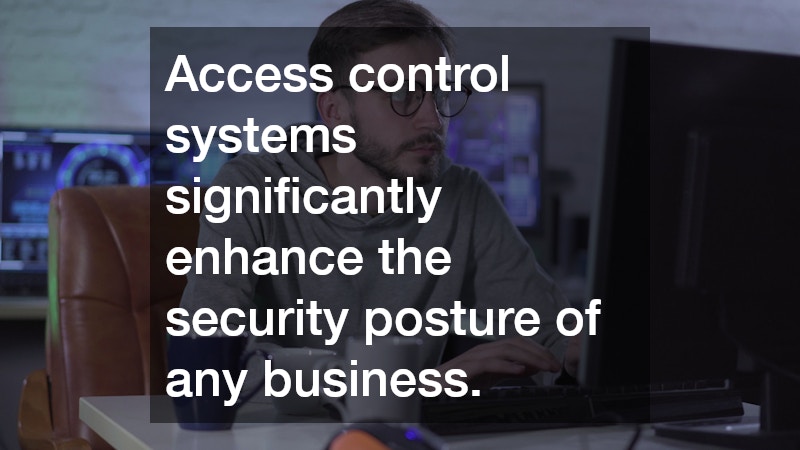In today’s fast-paced world, security is a primary concern for businesses of all sizes. With countless threats emerging from various directions, ensuring the safety of both physical and digital assets has never been more critical. One effective way to bolster business security is by implementing access control systems. These systems are designed to manage and monitor who can enter specific areas of your business, thus playing a crucial role in safeguarding your assets.
By integrating technology with security protocols, access control systems offer a comprehensive solution tailored to the modern business environment.
Enhancing Security with Access Control Systems
Access control systems significantly enhance the security posture of any business. Instead of relying solely on traditional locks and keys, businesses can incorporate electronic systems that provide more control over who enters and exits premises. These systems can range from simple card entry solutions to advanced biometric identification methods. By restricting access to authorized personnel only, businesses can minimize the risk of unauthorized entry, thereby preventing potential security breaches. Furthermore, access control systems often integrate with surveillance systems, offering a layered defense strategy to monitor and respond to security incidences as they occur.
Apart from deterring unauthorized access, these systems can track entry and exit activity in real time. Each access point becomes a monitored security checkpoint, logging who accessed which areas and when. This data permits businesses to detect unusual behaviors or patterns, offering an invaluable investigative and retrospective analysis tool. For example, if a security breach were to occur, businesses could quickly review access logs to pinpoint who was in the vicinity at the time and initiate appropriate responses. Access control systems, therefore, offer defined clarity and accountability within the business environment’s security protocol.
Moreover, having such systems in place can reduce the risk of internal theft. Staff access to high-value areas can be limited, ensuring that only authorized individuals have access to costly equipment, sensitive information, or specific departments. Eliminating physical keys also overcomes the vulnerabilities associated with lost or duplicated keys, providing an efficient way to instantly revoke access when an employee leaves or transfers positions. This adaptability and flexibility make access control systems an indispensable component of a modern security infrastructure for businesses.
Operational Efficiency through Automation
Implementing access control systems can streamline business operations significantly. Automation provided by these systems reduces the need for extensive human oversight in managing entry points. Businesses can set schedules for door locks and unlocks, thereby eliminating the manual processes associated with traditional lock systems. This ability empowers businesses to devote human resources to more critical tasks, enhancing overall productivity. Reduced reliance on security personnel not only cuts operational costs but also lowers the chances of human error, which could compromise security.
Integration with other business systems is another advantage that supports operational efficiency. Access control can be aligned with time and attendance tracking systems, automating processes like employee clock-ins and clock-outs. For instance, logging into the access control system could simultaneously record an employee’s attendance, simplifying payroll processes. This seamless integration helps maintain accurate records, saves valuable administrative time, and ensures compliance with labor regulations. Collectively, these efficiencies result in a more organized and accountable workflow.
In addition, access control systems can facilitate smooth visitor management. Many systems provide networks where visitor credentials can be issued temporarily, ensuring guests have access only to necessary areas during their stay. This capability enhances the professional image of a business by streamlining guest clearance processes while maintaining a secure environment. Automation in such visitor management helps businesses avoid disruptions and ensures that operations continue unhindered, maintaining a smooth flow of daily activities while protecting organizational assets.
Compliance and Legal Considerations
Businesses are increasingly subject to regulations that mandate robust security measures to protect sensitive information and assets. Access control systems can help enforce compliance with these regulations by providing a secure, auditable trail of access events. Industries such as finance, healthcare, and data management face strict compliance laws including standards like GDPR and HIPAA, which require companies to implement secure access protocols to protect client data. Thus, deploying access control systems aids businesses in demonstrating their commitment to safeguarding sensitive information, potentially averting legal consequences and penalties.
The use of access control systems also strengthens internal policy adherence. By granting access based on roles and responsibilities, businesses ensure compliance with internal security policies that dictate who needs access to certain areas. Any deviations from these guidelines are logged and can be investigated promptly, helping businesses maintain the integrity of access procedures. This role-based access decreases the risk of breaches arising from giving too many employees unrestricted entry, underscoring the essentiality of access control systems in maintaining policy compliance.
Furthermore, access control systems can be adapted to meet future compliance demands as regulations evolve. With the flexibility to integrate new requirements quickly, these systems provide businesses with the assurance that their security measures remain up-to-date with current laws and best practices. Compliance is not just about meeting current legal obligations—it is also about being proactive and prepared for future changes in regulations. Therefore, access control systems represent a forward-thinking investment in a business’s security infrastructure.
In conclusion, access control systems offer a multifaceted solution to modern-day security challenges faced by businesses. They enhance security by preventing unauthorized access, support operational efficiency through automation, and ensure compliance with various regulations. Embracing this technology can result in reduced risks, increased productivity, and peace of mind knowing that sensitive areas are protected. As threats continue to evolve, access control systems stand out as a necessary investment for businesses aiming to safeguard their assets and thrive in today’s competitive landscape.


